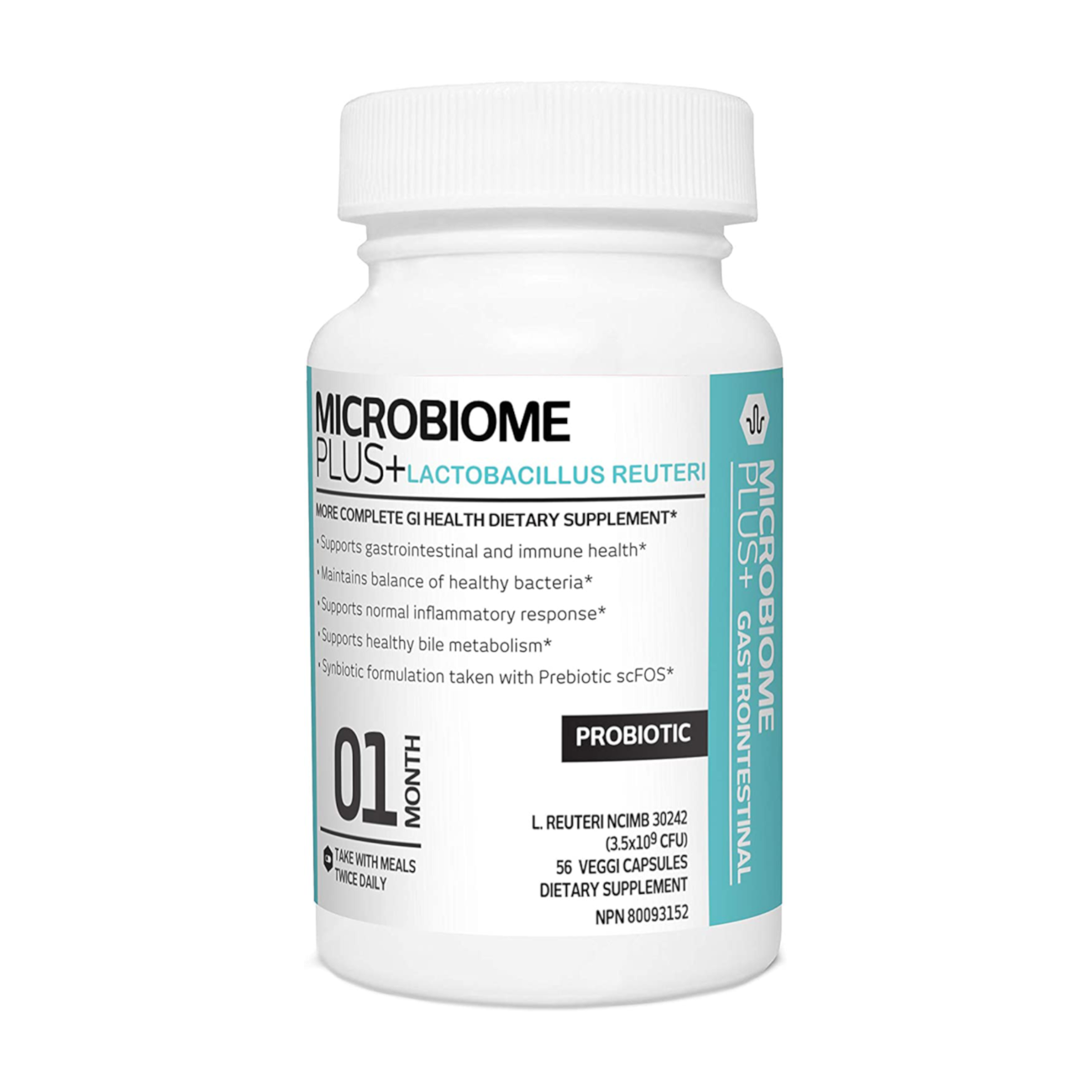All probiotics protect the gut microbiome, but some can also boost neurotransmitters that make you feel happy, calm, and focused. New research reveals that several strains show promise for improving mood and reducing depression and stress. The data on anxiety are mixed. Find out which probiotic strains are backed up by evidence in this post.
Disclaimer: This post is for informational purposes only. Please discuss your health concerns with your care provider and consult them before taking any supplements to avoid disease and drug interactions.
Buy clinically tested L. reuteri Probiotics
This article is an evidence-based overview of probiotic strains that can support your mental health and well-being based on clinical studies.
Unlike most posts on the topic, we’ll skip the animal and cell-based studies to focus on human data. Many probiotics may show effects in cells and animals but act differently in the human body.
Although the best clinically researched probiotics are listed in this article, more research is needed before any probiotic can be recommended to people with mental health disorders. It’s important to remember that probiotics and any other supplements should be a complementary strategy to, not a replacement for, standard therapy.
Can Probiotics Improve Your Mental Health?
Stress creates gut dysbiosis
We now know that the gut and brain are intricately linked. Scientists call this connection the gut-brain axis. Your gut and brain communicate through neurotransmitters, hormones, and metabolic and immune activity (Ma et al., 2021).
When your brain and gut are in harmony, you digest food with ease and feel uplifted, focused, and at peace.
Any change to your gut-brain communication can cause a ripple effect in your cognition, mood, behavior, and inflammation levels. These changes can be positive or negative. A healthy diet is a positive influence. Meanwhile, the main negative trigger for most people is stress.

Image taken from Bermúdez-Humarán et al., 2019
Studies show that stress can disturb the gut microbiome, and in turn, cause mental health problems like anxiety and depression (Ma et al., 2021).
A recent study revealed that gut microbiome imbalances caused by stress mirror changes in brain activity in areas that control mood and cognition (the prefrontal cortex). As a result of high levels of stress, the gut microbiomes of healthy participants became indistinguishable from those of patients with depression. This means that subtle changes in the gut microbiome may happen well before a person starts experiencing low mood or anxiety (Yamaoka et al., 2022).

Image taken from Bermúdez-Humarán et al., 2019
Enter psychobiotics
The gut-brain connection explains why taking something to improve mood or reduce stress without balancing the gut microbiome often doesn’t work. It also opens up a new category of supplements that target the brain through the gut: psychobiotics.
Psychobiotics are probiotics that act on the brain. Scientists define them as live organisms that produce mental health benefits at the right dosage (Dinan et al., 2013).
Psychobiotics can deliver brain-active substances like GABA—the main “calmness” neurotransmitter, and serotonin—the “happiness” hormone. Low levels of these neurotransmitters have been linked with depression and anxiety (Dinan et al., 2013).
Psychobiotics can also activate the vagus nerve, the main branch of the parasympathetic “rest-and-digest” nervous system. Vagus nerve activity counteracts the “fight-or-flight” stress response and helps you feel calm and focused. Vagus nerve stimulation is a promising therapy for many mental health problems and inflammatory conditions (Dinan et al., 2013; Breit et al., 2018).
Lastly, psychobiotics may reduce hypothalamic-pituitary-adrenal (HPA) axis activity. An HPA axis in overdrive makes stress hormones flood the body and exhausts the adrenal glands—a possible root cause of depression and chronic fatigue syndrome (Dinan et al., 2013).
Best Probiotics for Mood
In one of the first studies in this field, a simple probiotic yogurt improved poor mood in volunteers. Further studies tested specific strains—alone or as probiotic mixtures (Benton et al., 2006).
In a study of 38 healthy volunteers, a daily probiotic mixture (containing Lactobacillus fermentum LF16, L. rhamnosus LR06, L. plantarum LP01, and Bifidobacterium longum BL04) taken for 6 weeks reduced depressed mood, anger, and fatigue and improved sleep (Marotta et al., 2019).
In another study, taking probiotics daily (L. helveticus R0052 and B. longum R0175) reduced feelings of distress, depression, anger-hostility, and anxiety and improved problem-solving in healthy volunteers (Messaoudi et al., 2011).
Another probiotic combo (containing B. bifidum, B. lactis, L. acidophilus, L. brevis, L. casei, L. salivarius, and L. lactis) reduced negative thoughts in non-depressed individuals over 4 weeks. Compared to the placebo, participants who received probiotics were less likely to have sad, ruminating, and aggressive thoughts (Steenbergen et al., 2015).
In 40 healthy volunteers, the probiotic B. longum 1714 caused brain activity changes linked with enhanced vitality and reduced mental fatigue. It also changed the brain’s response to social stress, suggesting it might help people better cope emotionally (Wang et al., 2019).
Another probiotic combination (Lactobacillus acidophilus Rosell-52 and Bifidobacterium longum Rosell-175) soothed stress-induced gastrointestinal symptoms. This probiotic mixture is being tested for potential mood benefits in further clinical trials (Diop et al., 2008; Gawlik-Kotelnicka & Strzelecki, 2021; Gawlik-Kotelnicka et al., 2021).
Best probiotics for mood:
- Lactobacillus fermentum LF16, L. rhamnosus LR06, L. plantarum LP01, and Bifidobacterium longum BL04
- Lactobacillus helveticus R0052 and Bifidobacterium longum R0175
- Bifidobacterium bifidum W23, Bifidobacterium lactis W52, Lactobacillus acidophilus W37, Lactobacillus brevis W63, Lactobacillus casei W56, Lactobacillus salivarius W24, and Lactococcus lactis (W19 and W58)
- Bifidobacterium longum 1714
- Lactobacillus acidophilus Rosell-52 and Bifidobacterium longum Rosell-175
Seasonal affective disorder & vitamin D
An often overlooked contributor to low mood is low vitamin D. Vitamin D deficiency has been linked with depression and seasonal affective disorder (SAD) in dozens of studies. Aside from sunshine and food, the gut microbiome can also affect your vitamin D levels (Menon et al., 2020; Frandsen et al., 2014).
The only probiotic clinically proven to boost vitamin D levels is L. reuteri NCIMB 30242 (Jones et al., 2013).
No probiotic has yet been tested specifically in people with SAD.
Best Probiotics for Depression
Large meta-analyses of clinical studies concluded that probiotics seem to reduce depressive symptoms in patients with major depressive disorder under 60 years old (Huang et al., 2016).
In an analysis of 7 studies, both prebiotics and probiotics showed promise for anxiety and depression in adults. Patients with other health problems that probiotics also help with, like IBS, experienced greater benefits (Noonan et al., 2020).
The most commonly tested strains were Lactobacillus acidophilus (tested in three studies), Lactobacillus casei (tested in two studies), and Bifidobacterium bifidum (tested in two studies).
In 40 patients with depression, a supplement containing these 3 strains over 8 weeks improved depression scores. The potential benefits may extend beyond the brain—supplementation also improved insulin resistance, inflammation (hs-CRP), and antioxidant status (glutathione) (Akkasheh et al., 2016).
Another review came to similar conclusions but included a couple of other strains (Smith et al., 2021).
Probiotics were even tested for improving mood in pregnant and breastfeeding women. Women who took Lactobacillus rhamnosus HN001 daily from pregnancy until 6 months postpartum had less depression and anxiety postpartum (Slykerman et al., 2017).
Best probiotics for depression:
- Lactobacillus acidophilus
- Lactobacillus casei
- Bifidobacterium bifidum
- L. bulgarigus
- L. rhamnosus
- L. helveticus
- B. breve
- B. longum
- L. rhamnosus HN001 (during pregnancy and breastfeeding)
Best Probiotics for Anxiety & Stress
The data on probiotics for anxiety are mixed, but most studies suggest more benefits for mood and stress than for feelings of anxiety.
In an analysis including 335 people, three out of four studies reported improvements in anxiety from probiotics; one study reported improvements only in mood (Vitellio et al., 2020).
In one trial, Lactobacillus plantarum P-8 for 12 weeks reduced stress and anxiety in stressed adults. Supplementation also increased microbial diversity, gut bacteria that produce neurotransmitters, and levels of neuroactive compounds in the gut (short-chain fatty acids, GABA, arachidonic acid, and sphingomyelin)—all of which help combat stress (Ma et al. 2021).
Probiotic Lactobacillus casei strain Shirota (LcS) over 8 weeks reduced salivary cortisol spikes and symptoms of stress in healthy medical students under academic exam stress; it also improved sleep quality (Takada et al., 2016;Takada et al., 2017).
Another probiotic (Lactobacillus helveticus R0052 and Bifidobacterium longum) over 30 days reduced stress and anxiety as well as urinary levels of the stress hormone cortisol in healthy volunteers (Messaoudi et al., 2011).
In other studies, probiotics had no effects on anxiety. One analysis concluded that probiotics seem to be effective at reducing symptoms of depression in both depressed and anxious patients but that they don’t improve anxiety levels (Chao et al., 2022).
Probiotics also hold promise in specific stressful situations like impending surgery or natural disasters.
In one trial, 3 weeks of Clostridium butyricum probiotics reduced anxiety in laryngeal cancer patients anxious about upcoming surgery (Yang et al., 2016).
In another interesting study, B. infantis M-63 improved mental health in victims who developed irritable bowel syndrome (IBS) after a flood disaster (Ma et al., 2019).
Best probiotics for anxiety & stress:
- L. plantarum P-8
- L. casei Shirota
- L. helveticus R0052
- B. longum R0175
- B. infantis M-63 (IBS from stress)
- L. paracasei subsp. Paracasei F19, L. acidophilus La5, and B. lactis Bb12 (IBS anxiety)
- B. lactis BB12, L. casei, L.acidophilus, L. rhamnosus, L. bulgaricus, B. breve, B.longum
- Clostridium butyricum (not commercially available but you can try butyrate-boosting foods or supplements)
Probiotics for Mental Health—the Bottom Line
Top clinically researched probiotics for mental health include B. longum, L. acidophilus, L. casei, B. bifidum, and L. plantarum P-8.
Probiotics show promise for reducing stress in healthy people and for improving mood in healthy people and in patients with mood disorders. Probiotics seem to have little or no effect on anxiety symptoms alone.
Although the existing studies are promising, larger trials are needed to determine the benefits of probiotics in people with specific mental health disorders.
Probiotics may also contribute to mental well-being by soothing inflammation and boosting key nutrients in the body. L. reuteri NCIMB 30242 is the only strain clinically proven to increase vitamin D levels in the body.
Read Next:
- Are Your Gut Microbiome Bacteria Healthy or in Dysbiosis?
- How to Maximize L. Reuteri NCIMB 30242 Probiotic Benefits
- How & When to Take Lion’s Mane + Dosage

Ana Aleksic, MSc (Pharmacy)
Ana is an integrative pharmacist and scientist with many years of medical writing, clinical research, and health advising experience. She loves communicating science and empowering people to achieve their optimal health. Ana has edited 800+ and written 200+ posts, some of which reached over 1 million people. Her specialties are natural remedies, drug-supplement interactions, women’s health, and mental health. She is also a birth doula and a strong advocate of bridging scientific knowledge with holistic medicine.










